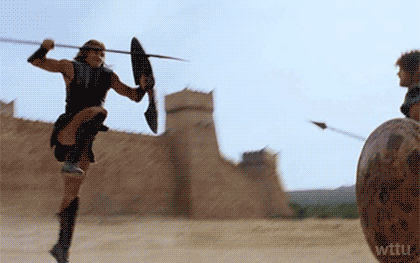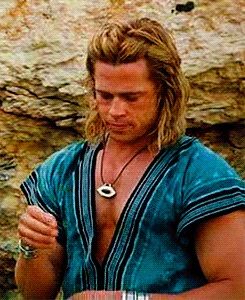
The Iliad by Homer
Translator: Robert Fitzgerald
Series: None
Published: 800 B.C.
Publisher: Farrar, Straus and Giroux
Pages: 632

Though I gave this a low rating, I am very glad to have read it. Not just because it's "one of those books," but because of the insight it gives into Greek culture. Plainly put, Homer is the only one who will give you the earliest and purest understanding of Greek life. He lays down the law of how people should live their lives. Writers after him choose to either agree or disagree (and disagreeing is the interesting part). So while I can confidently say that I now understand early Greek thought, I can also say that I very much disagree with almost all of it.Anger be now your song, immortal one,Akhilleus' anger, doomed and ruinous, that caused the Akhaians loss on bitter lossand crowded brave souls into the undergloom, leaving so many dead men-carrionfor dogs and birds; and the will of Zeus was done.
Since it was first published more than twenty-five years ago, Robert Fitzgerald's prizewinning translation of Homer's battle epic has become a classic in its own right: a standard against which all other versions of The Iliad are compared. Fitzgerald's work is accessible, ironic, faithful, written in a swift vernacular blank verse that "makes Homer live as never before" (Library Journal).
So I don't know how many of you have seen the movie Troy with Brad Pitt and Eric Bana.

But it's a pretty cool movie.
 I'm sorry but can we just look at those arms.
I'm sorry but can we just look at those arms.
Anyways, this movie was the only experience I had with the book before reading it. I knew it was a very loose adaption, but I still think it is a very fun movie. Essentially, the movie adapts the book from the perspective that the gods cannot physically intervene or be physically seen (and trust me, this is a huge difference). Honestly, I'm not sure if anyone can get away with an accurate adaption of the book nowadays because it is so out of our time. And I'm not saying that because it's old. Plenty of old books we can relate to today, which is why we still read them. But current Greek fascination in books and movie, specifically in the YA sector (I'm looking at you, Rick Riordan) has leant a false perception of the Greek culture at this time. Here's how it really was:
Reading this was incredibly frustrating. The entire time, no one controls their own fate, so I continually asked myself, what's the point? That's the main reason I docked stars because I just couldn't reconcile my beliefs to those of the book. But it is undoubtedly a good book that I encourage many to try reading - preferably in a group setting where you can talk to others about what's going on (because believe me, you will need to rant to some people about it).

Anyways, this movie was the only experience I had with the book before reading it. I knew it was a very loose adaption, but I still think it is a very fun movie. Essentially, the movie adapts the book from the perspective that the gods cannot physically intervene or be physically seen (and trust me, this is a huge difference). Honestly, I'm not sure if anyone can get away with an accurate adaption of the book nowadays because it is so out of our time. And I'm not saying that because it's old. Plenty of old books we can relate to today, which is why we still read them. But current Greek fascination in books and movie, specifically in the YA sector (I'm looking at you, Rick Riordan) has leant a false perception of the Greek culture at this time. Here's how it really was:
- They didn't have free will
- They didn't even really want it at this time
- Everything is the gods fault
- Akhilleus was an arrogant arse
- Glory and Honor and whosyadaddy were the only things that mattered
- Don't even get me started on the women
Reading this was incredibly frustrating. The entire time, no one controls their own fate, so I continually asked myself, what's the point? That's the main reason I docked stars because I just couldn't reconcile my beliefs to those of the book. But it is undoubtedly a good book that I encourage many to try reading - preferably in a group setting where you can talk to others about what's going on (because believe me, you will need to rant to some people about it).

No comments:
Post a Comment